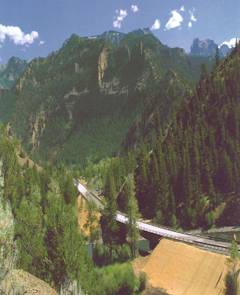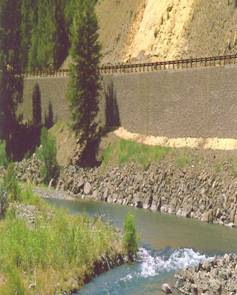U.S. Department of Transportation
Federal Highway Administration
1200 New Jersey Avenue, SE
Washington, DC 20590
202-366-4000
FHWA Resource Center
Office of Innovation Implementation
Volume 4, Issue 1
January 2008
LETTER FROM THE EDITOR
Dear Environmental Colleague,
Dear Reader,
Happy New Year! In this issue, we feature articles that highlight the fact that Environmental issues touch many areas of highway transportation. Guest authors Steve Mueller and Mark Doctor, from the FHWA RC’s Pavement & Material Team and Safety & Design Team respectively, demonstrate the power of partnership to achieve our goals as transportation professionals.
As always, if you have comments about a story or story ideas, please let us know.
Sincerely, Don Cote
Environment Technical Service Team (TST) Leader &
Editor–in-Chief
Phone: (720) 963-3210
E-mail: Don.Cote@fhwa.dot.gov
INSIDE
• Context Sensitive Support Team
• FALCON Team Takes Flight
• NEPA and Air Quality Training
• Beneficial Use of Industrial Materials Summit
• SENRLG Meeting Success
• Environmental Calendar

Caption: Photo of a bridge over a river in a mountain valley. Courtesy of Wyoming DOT.

Caption: Photo of a raised road and support wall next to a stream. Courtesy of Wyoming DOT.
Context Sensitive Solutions Support Team
KLynn Berry, FHWA RC, Environment TST
Mark Doctor, FHWA RC Safety and Design TST
In the October 2007 issue of the Environment Quarterly, we briefly described various initiatives of FHWA to assist our partners in fully implementing Context Sensitive Solutions. This article provides additional information on those activities, and outlines what you should expect to see from both the FHWA offices charged with integrating CSS throughout the agency, as well as AASHTO.
FHWA Support Team
In 2008, members of the Support Team will continue their work on two primary efforts: revisions to the National Highway Institute CSS course and implementation of a work plan to deliver technical assistance and training to all of the Divisions who requested it during the 2007 Self-Assessment Process. Through agency experts and consultant contracts, the Support team will deliver direct services to 45 Divisions in the coming year. The assistance will be provided in the following forms:
• NHI CSS Training Course
• Peer Exchanges
• CSS Action Planning
• Technical Assistance
• CSS Integration Guide and Self-Assessment Tool
• Training Assessment Guide and Self-Assessment Tool
• Executive Leadership Seminar/Peer Exchange
For more information on the activities of the Support Team, you may contact any of its members:
Support Team Member
Danyell Diggs HQ – Office of Planning 202-366-9629 Danyell.diggs@dot.gov
Mark Doctor RC – Atlanta 404-562-3732 Mark.doctor@dot.gov
Keith Moore HQ – Office of Environment 202-366-0524 Keith.moore@dot.gov
Keith Harrison RC – San Francisco 415-744-2657 Keith.harrison@dot.gov
Danyell Diggs HQ – Office of Planning 202-366-9629 Danyell.diggs@dot.gov
Mike Culp HQ – Office of Environment 202-366-9229 Michael.culp@dot.gov
Jeff Shaw RC - Illinois 708-283-3524 Jeffrey.shaw@dot.gov
Jeff Shaw RC - Illinois 708-283-3524 Jeffrey.shaw@dot.gov
Barbara Bauer HQ – Office of Infrastructure 202-366-0733 Barbara.bauer@dot.gov
K. Lynn Berry RC – Atlanta 404-895-6212 Klynn.berry@dot.gov
Mark Taylor CFL - Lakewood 720-963-3607 Mark.Taylor@dot.gov
AASHTO Task Force for Project Management and Delivery
The AASHTO Task Force on Context-Sensitive Solutions sunset at the end of the AASHTO Annual Meeting in 2007. A new task force, called the Task Force on Project Management and Delivery, was established to explore the need to address the cross-cutting project management and delivery issues among the traditional functional areas within State DOTs. This new Task Force will also continue the existing CSS work program identified jointly by AASHTO and FHWA. Following the September, 2006 Peer Exchange on CSS in Baltimore, selected participants continued the discussion about how to institutionalize CSS in both organizations. This preliminary planning work was then followed in October by a facilitated work session during the AASHTO annual meeting in Portland, OR. During this meeting, strategic goals were identified, and subcommittees were selected to develop and implement action plans relative to those goals. This process was documented in a report entitled Results of Joint AASHTO/FHWA Context Sensitive Solutions Strategic Planning Process. This document, and the goals identified in it, will continue to guide the work of the new task force.
The task force will report to the Standing Committee on Highways (SCOH). Its membership shall consist of a Chair (John Njord, UT) and 18 other members including:
• 8 representatives from SCOH and its subcommittees,
• 4 members each from Standing Committee on Planning (SCOP), Standing Committee on Environment (SCOE),
• 1 member from the Standing Committee on Quality, and
• 1 member from the Federal Highway Administration (Sandra Otto, AR)
According the resolution establishing the task force, an interim progress report will be delivered in the spring of 2008 and a final proposal will follow in the fall. It will describe not only the cross-cutting issues mentioned above but also, if needed, may recommend “a structure within AASHTO to address these issues and provide technical assistance.”
FHWA Resource Center
Both the Resource Center’s Environment Technical Service Team and the Safety and Design Team provide CSS training and technical assistance to Division Offices, State DOTs and, increasingly, Metropolitan Planning Organizations. As news of the benefits of a CSS approach continues to spread, a greater number of planners and even some municipal officials, are calling on the RC to assist them in the implementation of CSS in their community transportation projects. With more and more of these partners recognizing CSS as a smart way to do business, the transportation industry is certainly building strong momentum for full integration of CSS principles.
Some of these principles, such as early and continuous communication with stakeholders, or the preservation of environmental, scenic, aesthetic, historic, and natural resource values, have traditionally fit neatly within the realm of services provided by the Environment Team. It is important to note, however, that members of the Resource Center’s Safety & Design Technical Service Team also integrate the key messages of CSS into their courses, workshops, and technical services. Many transportation agencies face challenges on projects where apparent conflicts arise when providing solutions that reflect community values may necessitate designs that deviate from established design criteria. The proper application and practice of flexibility in highway design continues to challenge many agencies and causes discomfort among many design engineers.
In all of its courses and workshops, the Safety & Design TST incorporates the concepts of safety risk management and applying substantive safety knowledge to help designers better understand the basis behind the established design criteria and apply risk management concepts when assessing the tradeoffs of deviating from established design criteria. Workshops such as “Safety and Operational Effects of Geometric Design Features” and “Highway Geometric Design for Safety and Efficiency” provide design practitioners with the state-of-the-knowledge tools they need to make informed design decisions on projects and achieve flexible context-sensitive designs. Through this linkage of incorporating the key CSS messages into all safety and design courses, each members of the Safety & Design TST is in some degree involved with promoting CSS.
Together, the two teams have led peer exchanges, conducted management briefings, facilitated action planning, assisted in the development of policies, conducted design charrettes, led public meetings, recommended best practices, supported strategic planning relative to CSS, guided implementation strategies and collaborated on many other CSS activities around the country.
A CSS approach or process requires project proponents to be proactive in bringing all stakeholders together and tailoring designs to balance safety, mobility and preservation of scenic, aesthetic, historic, and environmental resources. In order to accomplish a true advancement of CSS principles by transportation agencies a collaborative effort is required. The collaboration of the Resource Center’s Environment Team and the Safety & Design Team on advancing CSS is an excellent example of the potential success that can be achieved through interdisciplinary efforts.
K. Lynn Berry
FHWA RC Environment TST
klynn.berry@fhwa.dot.gov
Mark Doctor
FHWA RC Safety & Design TST
mark.doctor@fhwa.dot.gov

Caption: Photo of a lanner falcon (Falco biarmicus) in the air with wings spread. [Purchased from istockphoto.com.]
FALCON Teams Take Flight
By Steve Mueller, FHWA Pavement and Materials Engineer
The FHWA Pavement and Materials Strategic Plan includes “Environmental Stewardship” as one of its six primary focus areas for program management.
New FHWA-wide teams have been formed to lead and coordinate FHWA efforts to plan and deliver activities to meet objectives established within each focus area of the Pavement and Materials Program. These new teams, better known as a FALCON Teams, have selected members from the FHWA Headquarters offices involved with the pavement and material program, including the Office of Pavement Technology (HIPT) and the Office of Asset Management (HIAM), as well as members from the Resource Center, the Office of Infrastructure, R&D (HIPT), Federal Lands Highway Division, and various Division Offices, as well as other FHWA Offices with expertise in each focus area.
FALCON Teams have been created for each of these Pavement and Materials Focus Areas:
1) Pavement Design and Analysis; 2) Pavement Materials and Construction Technology; 3) Pavement Management and Preservation; 4) Pavement Surface Characteristics; 5) Construction and Materials Quality Assurance; and 6) Environmental Stewardship.
Each FALCON Team has developed a Team Charter which includes: the purpose of the team; vision and mission statements; a membership list; and expected outcomes for the team. The teams have also developed Strategic Plans that include performance objectives, measures, targets and strategies that FHWA can employ to achieve desired outcomes for the Focus Area. A key activity currently underway is to benchmark the current state-of-the-practice in each of the focus areas, which is the first step in being able to measure the progress and impact of each team’s efforts. In addition, this effort will help to identify gaps that need to be addressed or existing innovations that need to be advanced to meet Focus Area objectives.
The Team Charter for the Environmental Stewardship FALCON Team includes the following sections:
Purpose: The Environmental Stewardship FALCON Team will develop a strategic plan for sustainable practices for highway pavement and materials to protect and enhance the human and natural environment and promote FHWA’s stewardship of the environment. The FALCON team will develop a multi-year strategic plan that establishes national environmental performance objectives, performance measures, strategies and activities for the Pavement and Materials program.
Vision: Our highways are designed, constructed, preserved and maintained to balance the natural and human environment in a sustainable manner.
Mission: Provide for a sustainable national highway infrastructure by promoting the cost-effective implementation of pavement and material practices, activities and technologies. We will protect and enhance the natural and human environment through systematic highway planning, design, construction, preservation, maintenance, and operations.
The Environmental Stewardship FALCON Team has the following four objectives:
1) Recycled Materials: The use of recycled highway materials in pavement construction, rehabilitation, preservation, and maintenance is maximized to the extent economical and practical with equal or improved performance.
2) Re-Use: The use of consumer, industrial, agricultural, or energy co-products in pavements and pavement-related materials is optimized to the extent economical and practical with equal or improved performance.
3) Environmental Innovations: The highway industry utilizes innovative technologies which are environmentally-sound and applies sustainable approaches to pavement design and material selections, construction, preservation, and maintenance.
4) Workforce Capability: The highway industry workforce is well-trained, well-connected, qualified, and experienced to conduct environmentally-sound paving and material practices.
Several activities have been funded in FY2008 to support these objectives. Warm-Mix Asphalt (WMA) is an exciting new technology that can reduce the energy demands of traditional Hot-Mix Asphalt (HMA). FHWA will be working to implement the findings from an international scan on WMA, to expand the use of this technology across the nation, and to evaluate the various asphalt additives that are required in the process. Recycled-Asphalt Pavement (RAP) is already a widely-used product in HMA, however many State DOT specifications have limitations on the use of RAP. FHWA has created an Expert Task Group to assist in expanding the use of RAP and in the evaluation of HMA pavements with high RAP contents. The Recycled Materials Resource Center (RMRC) is now a joint effort between the University of New Hampshire and the University of Wisconsin at Madison. FHWA is working closely with the RMRC and other partners to develop projects and informational materials to expand the use of recycled materials and the beneficial use of industrial by-products that can be re-used in a highway environment rather than landfilled. The Environmental Stewardship Team is also working with the EPA to share FHWA’s pavement and materials perspectives and support the expansion of the Green Highway Partnership.
Finally, here are some interesting facts about Falcons that led to its adoption as our team acronym: FALCON Facts:
• Incredible Vision! (8 times human eyesight)
• Results Oriented – they rarely fail!
• Productive – (dive 140 mph, handle 17 g’s)
• Strong – (carry load 6 times their weight)
For more information on the Environmental Stewardship FALCON Team, please visit: https://www.fhwa.dot.gov/pavement/enstewardship.cfm or contact Steve Mueller at Steve.Mueller@dot.gov.

Caption: Photo of an Arabian falcon sitting on the gloved hand of a handler. [Purchased from istockphoto.com.]
The Environmental Stewardship FALCON Team includes the following members:
Co-Chairs
Jason Harrington HIPT
Steve Mueller PMTST
Secretary
Eric Weaver HRDI
Members
Gina Ahlstrom HIPT
Chris Newman HIAM
Mike Arasteh PMTST
Connie Hill Galloway HEP
Patricia Cazenas HEP
Jeff Lewis CPTST
Ernie Bastian HRDI
Brad Neitzke FLHD
Jason Dietz CA Div
Bryan Cawley UT Div
Darrin Grenfell TX Div
Brian Smith RC-ENV-TST
Liaisons John Bukowski HIPT
Steve Gaj HIAM
Tom Harman PMTST
Jack Youtcheff HRDI
Marketing Support
Kathy Bergeron Marketing
For more information on the Environmental Stewardship FALCON Team, please visit: https://www.fhwa.dot.gov/pavement/enstewardship.cfm or contact Steve Mueller at Steve.Mueller@dot.gov.
NEPA & Air Quality Training Course
EPA Region 5 Office of Federal Activities will hold a NEPA and Air Quality training course in Chicago on Tuesday, 2/19/08 through Thursday, 2/21/08. This no-cost course is open to federal and state staff. Enrollment is limited to 30. For those planning to come or send staff from out of town, hotel information is posted to EPA's regional website: http://www.epa.gov/region5/visitor.
Registration will be handled through EPA's National Enforcement Training Institute website: www.netionline.com. This course should be posted by mid-December.
Save the date for the 2008 Beneficial Use of Industrial Materials Summit (formerly the Byproducts Beneficial Use Summit)
March 31 – April 3 in Denver
The 2008 Beneficial Use of Industrial Materials Summit, formerly the Byproducts Beneficial Use Summit, is designed to provide a forum for the exchange of information and ideas about beneficial use between regulators, industry, and other stakeholders.
The summit has been renamed to better reflect a materials management approach for reuse and recycling, and to better align with existing and developing strategic plans for achieving the environmentally safe beneficial use of industrial materials.
This conference is an opportunity for regulators, industry, and other stakeholders to:
• Exchange ideas about beneficial use
• Learn from case studies and new research
• Learn about the status of government programs
• Get “face-time” with regulators
Come listen and participate with representatives from the private sector, reuse and recycling community, non-profit organizations, trade associations, researchers, and local, state and federal government agencies to learn about the important issues, challenges, and successes surrounding the beneficial use of industrial materials.
The summit will be held at the Colorado Convention Center in downtown Denver. Complete details about the 2008 Beneficial Use of Industrial Materials Summit will be available online soon at www.beneficialusesummit.com, please visit this site often for up-to-date information and registration details.
We look forward to seeing you in Denver.
MS DOT’s Southeast Natural Resources Leadership Group (SENRLG) Meeting a Success By Kevin Moody, FHWA RC, Environment TST
Over 84 agency leaders and their key staff members attended the Mississippi Department of Transportation’s (MDOT) Natural Resources Leaders Group retreat November 28 – 30, 2007 in McComb State Park. The FHWA’s Federal Aid division office provided important leadership and support from planning, through the actual meeting, and in the follow up.
Division Administrator, Mr. Andrew Hughes, gave the introductory and closing remarks. Cecil Vick, Team Manager of the Project Development Team, gave the core talk on goals and objectives. Both joined Environmental Specialist, Dickie Walters, to ensure that participants made a genuine effort to build on common interests, respect differences, and aim for a world class standard of government service. Claiborne Barnwell, Environmental Division Engineer; Jeff Pierce, State Planning Engineer; and other members of the MDOT leadership team guided the participants through a series of discussions that led to some innovative ideas for the future.
A recurring comment made by resource agency staff during breaks and social events was the professionalism of the transportation agencies. The partners repeatedly expressed appreciation for the Division and MDOT’s willingness to explore collaborative opportunities, as well as the substantive and objective nature of other responses to comments and study requests.
What’s Going On?
Here are a few of the upcoming events of interest to the environmental community:
March 2008
March 13-14
GREENPRINTS 2008: SUSTAINABLE COMMUNITIES BY DESIGN
Atlanta, GA.
http://www.greenprints.org/
March 31-April 3
2008 Beneficial Use of Industrial Materials Summit
Denver, CO
May 2008
May 27-30
Weeds Across Borders, Banff
Alberta, Canada
June 2008
June 24-27
Air and Waste Management Association Annual Conference
Portland, OR
July 2008
July 13-17
AASHTO Standing Committee on the Environment
Monterrey, CA
July 21-23
TRB ADAC40 Transportation, Noise & Vibration Summer Meeting
Key West, FL
July 28-August 1 (tentative)
TRB ADC10, ADC30 and ADA40 Environment
Joint Summer Meeting
Denver, CO.
November 2008
November 13-14
Road & Dust Management Practices and Future Needs Conference
San Antonio, TX
www.meetingsnorthwest.com/dustconference.htm
For additional conferences and events, see FHWA's Planning, Environment & Realty calendar at www.fhwa.dot.gov/hep/calendar.htm.
CONTACT INFORMATION:
Editor–in-Chief
Don Cote
Environment Technical Service Team (TST)
Team Manager
Phone: (720) 963-3210
don.cote@dot.gov
TST Editorial Board Members:
David Grachen, Brian Smith, and David Sullivan
FHWA Resource Center
Aung Gye
Office of Project Development &
Environmental Review, FHWA HQ
Managing Editor:
Marie Roybal,
FHWA Resource Center
marie.roybal@dot.gov
Due to Quarterly publication schedule, all article submissions for future issues are due to the Editor-In-Chief by the 15th of March, June, September, and/or December
*If you would like to receive this newsletter electronically, please send your email address to:
marie.roybal@dot.gov